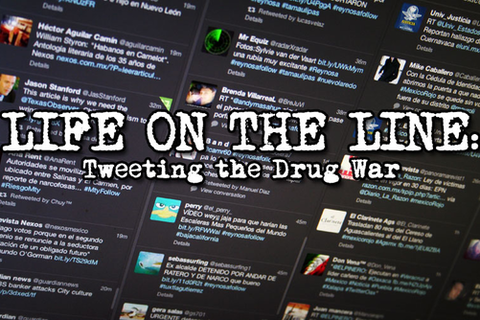
Austin, Texas — Twitter, but increasingly Facebook and YouTube, are becoming essential elements to the way ordinary people in Mexico protect themselves from the war on drugs, according to experts sitting on a panel at South By Southwest Interactive called, “Life on the Line: Tweeting the Drug War.”
Panelists included University of Texas at Brownsville professor Guadalupe Correa-Cabrera, and journalists Melissa Del Bosque and Sergio Chapa.
Correa-Cabrera spoke about a study she’s been doing specifically on the border state of Tamaulipas, which she said is characterized by being the “cradle” of the Zetas cartel, having more bridges to the U.S. than any other Mexican state, and especially the city of Reynosa has seen much more violence than other areas.
After Mexican President Felipe Calderón declared war on the drug cartels in 2006, and then in 2010 when the Zetas and Gulf Cartel stopped working together, the violence exploded, Correa-Cabrera said. Consequently, journalists stopped covering the issue all together to avoid being killed, and so social media emerged as the go-to medium for information.
“The formal media was not reporting these events. This is a war, even if the Mexican authorities don’t call it [that], we’ve seen many manifestations of war in the country, like the number of people who have been killed, the number of places we find them — and social media users are doing this work,” Correa-Cabrera said, noting that social media is the only way she could get info about territorial control of the drug cartels in Tamaulipas.
“Because Tamaulipas is the most silenced state, that is why the network of Twitter users that report on violence has been the most sophisticated one in the country, and the number of hashtags is the most sophisticated and active one in the country,” she said. “That was a response to violence.”
Del Bosque noted that social media use pertains to everyone in the state because, increasingly, anyone who is not involved with the drug cartels is also a victim. This includes human rights workers, teachers, civilians, to the tune of 100,000 estimated deaths since 2006, 27,000 disappeared and 230,000 people displaced (probably the figures are higher, she said).
But, once people began turning to social media instead of institutional media for information, the cartels also started to harass social media users instead of journalists. The result was the murder of the first freelance journalist/social media users in Nuevo Laredo in September of 2011.
Mainstream media in the U.S. has begun to depend on social media users to report on violence in Mexico, added Chapa, noting that he himself has built relationship with Twitter users who express concern over their own safety. Photos and videos of gun battles and violence no longer come from Mexican TV — but from Twitter and YouTube, he said. And Facebook is also a place where Mexicans congregate online to search for loved ones, or find out how to stay safe.
American-made social media is affecting the cartels, too, he noted, explaining that “traditional” narco-corridos have been replaced by narco hip hop ballads. Ultimately, the anonymity afforded by social media is the same feature that makes it as reliable as it is unreliable, everything has to be double checked, he said. But, “If you want to report on crime using social media, the narcos are very aware,” he said.






3 Trackbacks
[…] < mafermachuca Get flash to fully experience Pearltrees How Twitter, social media impacts Mexico’s drug war | Más Wired Austin, Texas — Twitter, but increasingly Facebook and YouTube, are becoming essential elements […]
[…] How Twitter, social media impacts Mexico’s drug war | Más Wired Austin, Texas — Twitter, but increasingly Facebook and YouTube, are becoming essential elements to the way ordinary people in Mexico protect themselves from the war on drugs, according to experts sitting on a panel at South By Southwest Interactive called, “ Life on the Line: Tweeting the Drug War .” Panelists included University of Texas at Brownsville professor Guadalupe Correa-Cabrera, and journalists Melissa Del Bosque and Sergio Chapa. Correa-Cabrera spoke about a study she’s been doing specifically on the border state of Tamaulipas, which she said is characterized by being the “cradle” of the Zetas cartel, having more bridges to the U.S. than any other Mexican state, and especially the city of Reynosa has seen much more violence than other areas. 'Four trucks filled with bodies' after Reynosa firefight REYNOSA — Fear and panic filled the streets of Reynosa on Sunday night as rival gunmen battled during a three-hour firefight that saw automatic weapons and grenades used. Surprisingly, Mexican authorities were absent for most of the melee. A few weeks ago, while I was visiting a city in northern Mexico, I witnessed some of the drug-related violence people have been experiencing almost every day: several bodies were hung from a bridge and a number of shootouts were reported throughout in the city. As if that was not terrifying enough, I was not able to learn about those events through the news media. Instead, like many people in these cities, I learned about them on Twitter. […]
[…] through popular hashtags is reminiscent of the search method used previously to document tweets in Mexico about the drug war. This might not find every tweet related to the incident (as not all […]